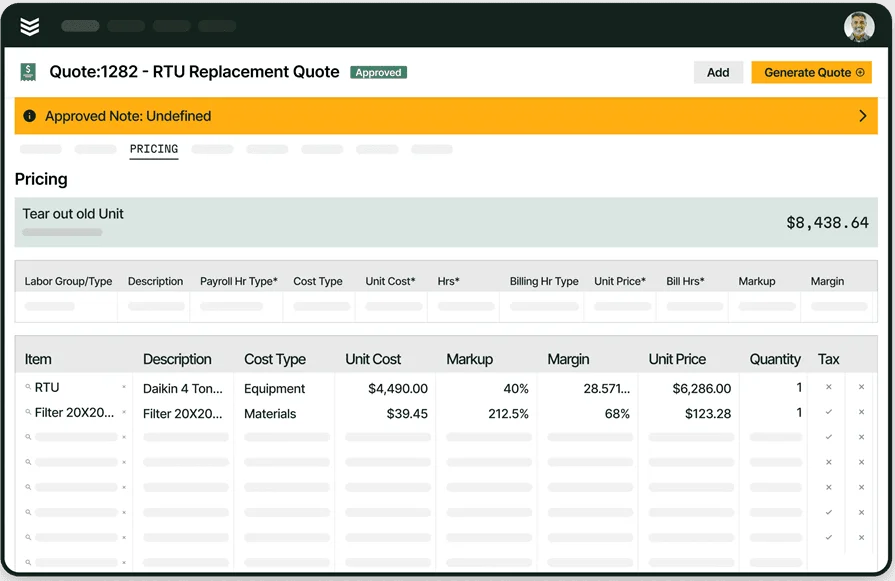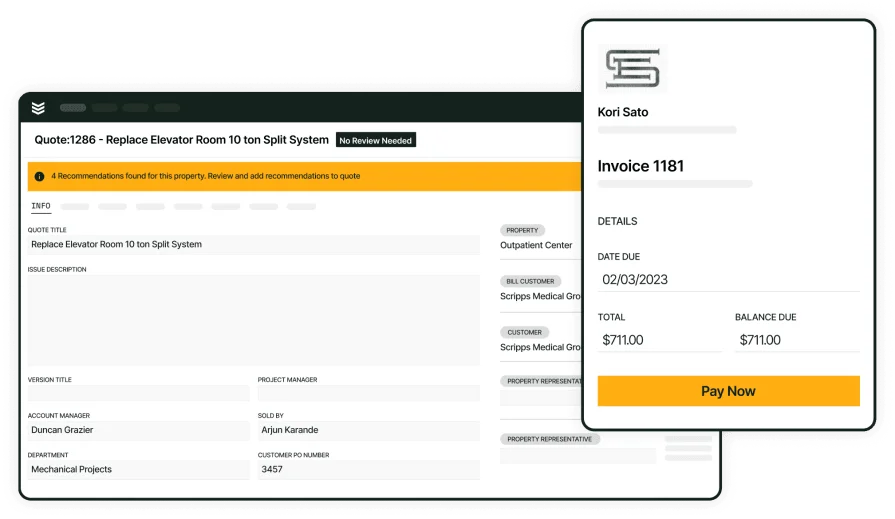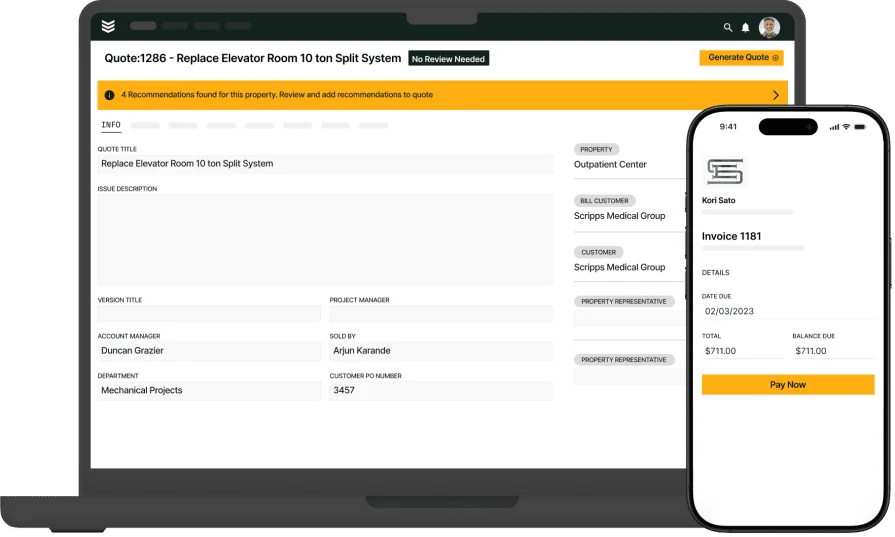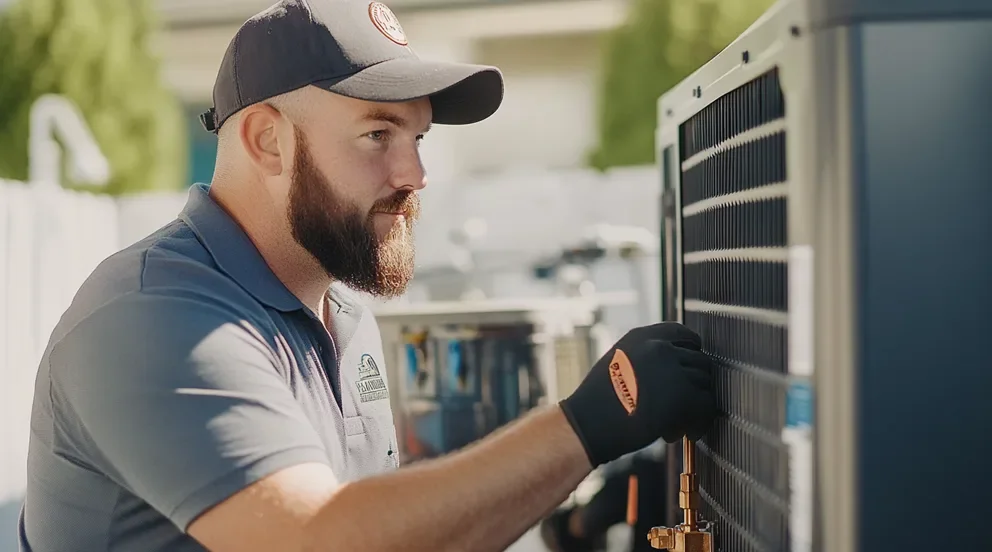When your team’s out in the field, you don’t have time for guesswork. A clear, accurate HVAC quote sets the tone for every job—whether it's a small repair or a full system replacement. It’s how you win trust, avoid surprises, and keep projects profitable.
This guide walks through everything you need to know, from writing up a commercial HVAC quote to choosing the right HVAC quote template for the job. Whether you're estimating labor or materials, this guide helps you build quotes that close more deals—and do it faster. And if you're looking for tools built for the HVAC industry, we’ll show you exactly where to start. In this HVAC quoting guide, we’ll cover everything, including:
- What is an HVAC quote?
- How to write an HVAC quote
- 7 benefits of using HVAC quotes to land jobs
- 6 HVAC quote templates to use and learn from
Before you start filling in numbers or sending out estimates, it’s worth stepping back. What exactly goes into a solid HVAC quote? What makes one good enough to land the job on the spot? Whether you're quoting for a quick repair or mapping out a large commercial HVAC quote, getting the fundamentals right makes all the difference.
Let’s break down what an HVAC quote really is—and why it matters more than most folks think.
What is an HVAC quote?
An HVAC quote is a written estimate that breaks down the expected costs, labor, equipment, and scope of work for a heating, ventilation, or air conditioning job. It gives both the contractor and customer a clear understanding of the job requirements, pricing, and timeline—before work begins.
In any solid field service management system for HVAC businesses, the quoting process is a core part of the workflow. A well-built HVAC quote helps teams stay aligned across scheduling, dispatch, and billing. It acts as the blueprint for service delivery—whether it’s a quick repair or a full commercial HVAC quote with multiple components. A strong quote builds trust, saves time, and reduces callbacks.
Why HVAC quoting is important
A good HVAC quote doesn’t just help you win the job—it sets the foundation for everything that follows. From the first site visit to the final invoice, your quote is the anchor point for cost, scope, and scheduling. Without one, you're leaving room for miscommunication, scope creep, and billing disputes that eat into your margins.
Quoting also plays a critical role in how HVAC businesses approach field work and operations. It connects directly to how you track labor, calculate material needs, and structure timelines. That’s why estimating and quoting aren’t separate tasks—they’re part of the same playbook. Teams that dial in their process for estimating for HVAC tend to produce quotes that are faster, more accurate, and easier for both techs and customers to understand.
For commercial jobs especially, where the scope is broader and the stakes are higher, quotes act as both a proposal and a protection. They clarify deliverables, help justify costs, and give your customers confidence that the job will be done right.
How to write an HVAC quote
Writing a professional HVAC quote starts with knowing what your customer needs—and ends with a clear, detailed breakdown of what it’ll take to get the job done. Whether you're quoting a single-unit repair or a full commercial HVAC quote, the format stays the same: scope, costs, timeline, and terms. Miss any of those, and you're asking for confusion or a callback that costs you time.
To get it right, your quote needs to reflect real-world pricing. That means current labor rates, updated material costs, and an understanding of job complexity. You’ll also want to tailor your approach depending on whether the work is residential or commercial. A one-size-fits-all quote won’t cut it, especially if you’re bidding against competitors using custom HVAC quote templates or software that does the math for them.
But it’s not just what’s in the quote—it’s how fast you can build it. The faster and more accurate your quote, the better your shot at landing the job. And the right process can help you build quotes that close deals without second-guessing.
Crafting HVAC quotes that close more jobs faster
An HVAC quote should do one thing well—give your customer a clear, no-fluff breakdown of what’s included, how much it’ll cost, and when the work will get done. It’s not just paperwork—it’s your pitch, your plan, and your protection. On bigger scopes like a commercial HVAC quote, clarity matters even more. Every detail counts when the job spans multiple systems, floors, or timelines. Here’s how to build quotes that get the green light fast.
1. Conduct a detailed site evaluation
Before you quote a dollar, you need the facts. Visit the job site to inspect existing equipment, take measurements, and check for code issues or access challenges. Note the system’s age, condition, and whether you’re looking at a repair, retrofit, or full install. Ask the client about current problems, desired upgrades, and timeline expectations. This gives your quote a solid foundation—and limits surprises once work starts.
2. Break down labor and materials accurately
Start with labor. Estimate the number of hours based on the job’s complexity, crew size, and required certifications. Then calculate the materials: equipment, fittings, fasteners, ductwork, insulation, refrigerant—every piece that goes into the job. Use current supplier pricing and include markups for profit and overhead. If you’re quoting across phases or zones, as is often the case in commercial HVAC quotes, separate each section clearly so nothing gets missed.
3. Define the scope of work in plain language
Lay out exactly what you’re doing. Are you removing old equipment? Rebalancing airflow? Upgrading controls? Be specific. Include tasks like testing, clean-up, and permitting. Just as important—call out what’s excluded. This keeps the job from ballooning and protects your crew from being pulled into “small extras” that weren’t quoted. A clear scope gives both you and your client a shared understanding from day one.
4. Add pricing, terms, and project timeline
Once you’ve defined the scope and tallied your costs, organize them in a clean, readable format. Show line-item pricing where possible: labor, materials, rentals, and third-party services. Outline your payment schedule, including deposits and final balances. Add terms for delays, cancellations, and warranty coverage. Be upfront about change orders and how additional work will be billed. If you're using quoting software, this step becomes faster and more consistent—especially when you’re sending out multiple HVAC quotes each week and need a system that minimizes manual entry.
5. Review, then send digitally for faster approval
Before you hit send, double-check every line. Look for typos, missed items, outdated pricing, or unclear phrasing. Run the quote past a second set of eyes if needed. Then send it digitally with e-signature enabled. Whether you’re quoting a rooftop unit replacement or a multi-system install, speed matters. The faster a clean quote hits the customer’s inbox, the sooner you get that “approved” reply.
The essential components of an HVAC quote
A complete HVAC quote should answer the key questions your customer hasn’t asked yet. What work is being done? When will it be finished? What happens if something changes? Each section of your quote plays a role in setting clear expectations and protecting both your team and the client. This is critical across the board—but even more so when building a commercial HVAC quote where the scope, liability, and HVAC quote cost are significantly higher. Here’s what every professional quote should include.
- Scope of work: This outlines the tasks your team will handle. Whether you're replacing a rooftop unit, upgrading ductwork, or servicing controls, the scope needs to be clear and specific. It gives the client a direct view into the job and keeps your crew aligned on what’s actually included.
- Service timeline: Customers want to know when the work starts, how long it will take, and what the major phases look like. A timeline helps prevent scheduling confusion and gives everyone a target to work toward—especially helpful on projects with multiple subcontractors involved.
- Installation and labor costs: Break out your pricing clearly. Show how the HVAC quote cost is calculated—labor hours, rates, materials, and any special equipment. Transparency here avoids pushback later and helps justify the total price if questions come up.
- Warranty and maintenance: Include any equipment warranties and clarify what service is covered after the install. Add maintenance options if you offer them. This shows you're thinking beyond the job itself and builds long-term trust with the customer.
- Contact information: Make it easy for the customer to reach you or your project lead. Include names, phone numbers, and emails. This sounds basic—but leaving it out leads to follow-up delays and lost momentum, especially when decisions need to be made quickly.
- Payment terms: Lay out your deposit structure, progress payment schedule, and accepted payment methods. If you're billing on milestones or deliverables, explain when those apply. Clear terms help you get paid on time and prevent awkward money talks later.
- Contingency clauses: Jobs change. Make space in your quote for things like hidden damage, change orders, or permit delays. Stating how these will be handled keeps you covered and sets the expectation that not everything is set in stone.
- Compliance: For commercial or regulated projects, note any licensing, inspections, or code requirements that apply. Showing that your quote accounts for local compliance adds credibility and keeps your crew out of red-tape trouble down the line.
A well-crafted HVAC quote is crucial for securing projects and fostering trust with clients. Clarity, detail, and ease of understanding are key to its effectiveness and provide significant benefits to your business.

Estimate jobs with precision
Don’t struggle to craft HVAC quotes—automate the process with BuildOps
7 benefits of using HVAC quotes to land jobs
Sending out a professional HVAC quote isn’t just about checking a box. It can set your business apart, give customers peace of mind, and move jobs forward faster. When your quote shows that you've thought through every detail—costs, timelines, terms—it builds trust before anyone even signs off. Here’s how strong quoting practices directly benefit your bottom line.
1. Builds trust from the start
A clear quote shows you’ve done your homework. It gives the customer a detailed view of the work ahead, from materials to labor to pricing. This kind of upfront clarity tells the client you’re reliable—especially important in commercial HVAC quote scenarios where trust drives repeat work.
2. Speeds up job approvals
When a quote spells everything out—scope, timeline, cost—it cuts down the back-and-forth and gets you to a signed agreement quicker. This becomes even more effective when paired with tools that speed up the entire workflow. A deeper look at how that works is outlined in our HVAC estimating software resource, which connects accurate quotes with faster approvals and fewer delays.
3. Protects your margins
Guesswork is expensive. A detailed HVAC quote cost breakdown helps ensure you’re not underbidding or leaving out labor, permits, or markups. Accurate quoting based on real numbers lets you protect profit while still staying competitive.
4. Prevents confusion during the job
With a clear quote, there’s no second-guessing what was promised. Customers and crews know exactly what’s being delivered. That alignment leads to fewer change orders and less scope creep—two issues that can derail project timelines. This is especially helpful when paired with systems covered in our HVAC bidding guide, where the quote becomes the anchor for all future communication.
5. Strengthens close-out and billing
When the quote matches the final invoice, payments move faster. Clients are less likely to dispute charges when they’ve already agreed to the numbers upfront. Need a clean way to tie it all together? Our HVAC invoice template page shows how consistent documentation—from quote to invoice—can reduce friction and build confidence at handoff.
6. Supports legal protection and clarity
A solid quote includes terms, scope, and disclaimers that protect your business if something unexpected comes up. This is especially critical when dealing with liability or contract language. If you're looking for formal documentation, our HVAC contract templates show how the quote plays into broader agreements that back you up legally.
7. Keeps your team aligned
A detailed quote acts as a playbook for your field techs. It defines the work, sets expectations, and syncs with scheduling. When it’s done right, everyone’s working off the same plan. This is a huge win when integrated with dispatch and scheduling tools like the ones we cover in our HVAC scheduling and dispatching guide.
6 HVAC quote templates to use and learn from
Whether you're quoting a $300 service call or a six-figure retrofit, having a reliable HVAC quote template saves time and reduces errors. Templates help standardize your estimating process so you can turn around quotes faster without missing key details. Below are six tools—ranging from simple PDFs to software-backed systems—that can help you build better, faster quotes.
1. BuildOps
This isn’t a fillable PDF—it’s quoting powered by software. BuildOps gives you the ability to create quotes tied directly to your service workflows, parts database, and scheduling. It’s ideal for commercial contractors who need real-time updates, version control, and seamless job handoffs. Built-in automation also makes it easier to track markup, tax, and warranty terms at scale.
Template Format: Software
Cost: Schedule a free demo for custom pricing that is fit for your operations
Most Useful For: Commercial HVAC teams looking to scale quoting and integrate with field operations

Give BuildOps a Try
Build faster quotes for commercial HVAC projects—without the guesswork.
2. Invoice Simple
Image Source: InvoiceSimple
Invoice Simple offers a downloadable HVAC quote template in PDF and Word formats. It's clean, minimal, and easy to use for single jobs or small service shops. You won’t get advanced features like real-time pricing or automation, but it gets the job done for basic residential estimates.
Template Format: PDF / Word
Cost: Free
Most Useful For: Independent HVAC contractors needing quick, printable estimates without setup time
Download the ready-to-use Invoice Simple’s free HVAC estimate for instant quoting.
3. Invoice Maker
Image Source: Invoice Maker
Invoice Maker provides editable quote forms designed to be customized directly in your browser or downloaded as PDFs. Its interface is straightforward, and the tool is ideal for small businesses that want to send digital quotes with a clean, branded look. However, it lacks deeper job tracking or integration features, which may limit its usefulness for growing HVAC teams.
Template Format: PDF / Editable Web Form
Cost: Free
Most Useful For: Small HVAC businesses that want a basic online solution with minimal learning curve
You can access Invoice Maker’s HVAC estimate template to start building quotes fast.
4. inv24
Image Source: inv24
inv24 offers a no-frills HVAC quote template that’s easy to edit and download. It works well for contractors who need to create basic estimates on short notice. While it lacks deeper integrations or automation, it covers the essentials—line items, totals, customer info—without making you jump through hoops.
Template Format: PDF / Word / Spreadsheet
Cost: Free
Most Useful For: HVAC service pros looking for a plug-and-play option that doesn’t require learning new tools
Grab the editable Inv24’s HVAC quote template and start quoting jobs without slowing down.
5. Online Invoices
Image Source: OnlineInvoices
Online Invoices offers customizable quote templates through a simple interface that’s great for solo contractors or small teams. Quotes can be saved, sent, and managed through your browser—no installs or downloads needed. It’s a lightweight way to manage quoting without getting tangled in complex platforms. That said, it doesn’t offer much beyond basic quoting, so it may fall short for teams needing scheduling or service tracking.
Template Format: Web-based / PDF Export
Cost: Free
Most Useful For: HVAC contractors who prefer to handle estimates entirely online from any device
Check out Online Invoices’ HVAC quote template to quote from anywhere without software headaches.
6. FreshBooks
Image Source: FreshBooks
FreshBooks offers a clean, professional-looking estimate tool as part of its accounting platform. The free HVAC quote template works well as a standalone PDF or inside the full FreshBooks system if you’re already using their invoicing or bookkeeping tools. Its real strength is in combining quoting with your financial workflow. But if your business relies heavily on field service coordination, FreshBooks won’t cover job management or dispatch needs.
Template Format: PDF / Web-Based Software
Cost: Free or paid plans depending on features
Most Useful For: Contractors who want quoting, invoicing, and accounting handled in one place
Use FreshBooks’ HVAC estimate template if you need something clean and professional to send in minutes.
Templates are useful—but they have limits. Every time you copy, paste, update pricing manually, or email back and forth to clarify a line item, you’re spending time that could be going to the next job. When you’re managing multiple techs, layered scopes, or complex HVAC installs, quoting needs to move faster and leave no room for guesswork. That’s where software becomes a game-changer.
An all-in-one platform designed specifically for commercial HVAC contractors can turn quoting from a bottleneck into a win button. From pulling in parts lists to tracking margins and syncing with scheduling—everything runs smoother when your quote is built into your workflow. It’s not about ditching templates. It’s about leveling up from them.

Curious how BuildOps works?
Eliminate manual processing so you can quote—and get paid—faster.







